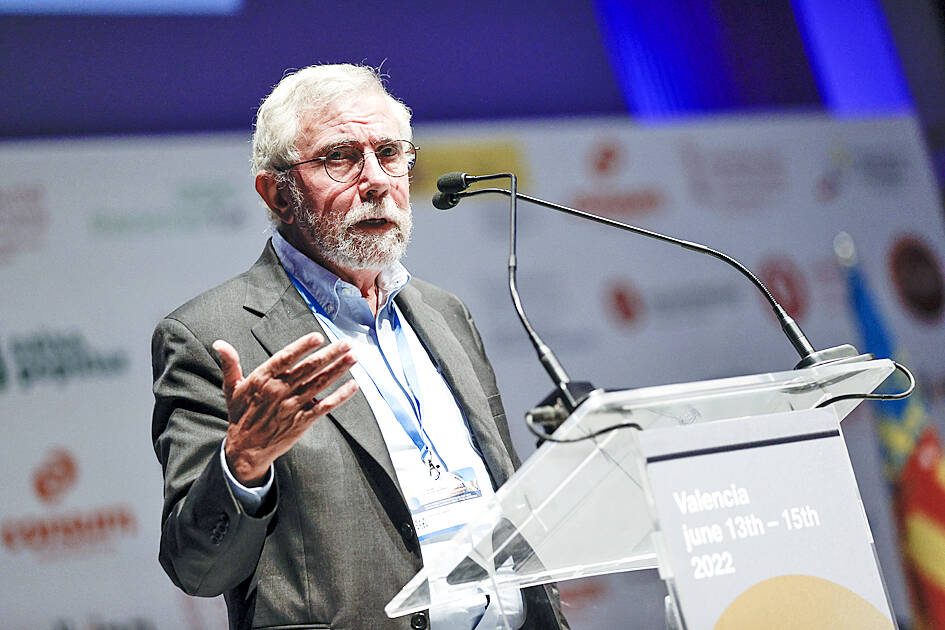China’s leaders are “bizarrely unwilling” to use more government spending to support consumer demand instead of production, according to Nobel laureate in economics Paul Krugman.
“The fact that we seem to have a complete lack of realism on the part of the Chinese is a threat to all of us,” Krugman told Bloomberg TV’s Shery Ahn and Haidi Stroud-Watts in an interview yesterday.
Krugman echoed criticism by US economic officials including Treasury Secretary Janet Yellen that China can’t simply export its way out of trouble. The comments come amid renewed concern in the US and Europe over what is viewed as Chinese overproduction and the dumping of heavily subsidized products overseas.

Photo: EPA-EFE
“We can’t absorb, the world will not accept everything China wants to export,” Krugman said on Bloomberg TV’s The Asia Trade program.
China’s whole economic model is not sustainable because of “vastly inadequate” domestic spending and a lack of investment opportunities, he added. Beijing should be supporting demand not more production, he said.
Another prominent economist, Stephen Roach, weighed in on China’s economy yesterday. He said he found a grim mood on the ground in Beijing during a visit recently, especially among entrepreneurs and students.
“I found a Beijing that really didn’t have much of the spark that I had been accustomed to over my many years of traveling there,” Roach said in a Bloomberg TV interview. “Certainly the best I could call it was a mood of grim resignation,” said the former chairman of Morgan Stanley Asia who now teaches at Yale University.
A regular policy adviser to the Chinese government, Li Daokui (李稻葵), predicted more supportive policies for the economy in the coming months. Speaking to Bloomberg TV, the Chinese economist called on Beijing to issue much more central government debt to make up for the inability of cash-strapped local authorities to spend money and drive growth.
Separately, a private survey yesterday showed China’s manufacturing activity expanded at the fastest pace in almost two years last month, contrasting with weak official data that dented the country’s growth outlook.
The Caixin manufacturing purchasing managers index rose to 51.7 last month from 51.4 in April, slightly above the median forecast of 51.6 by economists in a Bloomberg poll and the highest since June 2022. Any reading above 50 suggests an expansion.
The upbeat private survey results compared with China’s official manufacturing PMI published on Friday showing factory activity unexpectedly contracted last month. The two surveys cover different sample sizes, geographic locations and types of businesses, with the Caixin poll focusing on smaller and export-oriented firms.
The Caixin PMI has outperformed the official index for seven consecutive months since October last year. Economists have attributed the differences between the official and the private surveys this year to improved external demand but a subdued domestic market.
Key to China’s efforts to hit an annual growth target of around 5 percent, the manufacturing sector is threatened by rising trade barriers from the US, EU and other countries as tensions mount over complaints of Chinese overcapacity and unfair competition.

TAKING STOCK: A Taiwanese cookware firm in Vietnam urged customers to assess inventory or place orders early so shipments can reach the US while tariffs are paused Taiwanese businesses in Vietnam are exploring alternatives after the White House imposed a 46 percent import duty on Vietnamese goods, following US President Donald Trump’s announcement of “reciprocal” tariffs on the US’ trading partners. Lo Shih-liang (羅世良), chairman of Brico Industry Co (裕茂工業), a Taiwanese company that manufactures cast iron cookware and stove components in Vietnam, said that more than 40 percent of his business was tied to the US market, describing the constant US policy shifts as an emotional roller coaster. “I work during the day and stay up all night watching the news. I’ve been following US news until 3am

Six years ago, LVMH’s billionaire CEO Bernard Arnault and US President Donald Trump cut the blue ribbon on a factory in rural Texas that would make designer handbags for Louis Vuitton, one of the world’s best-known luxury brands. However, since the high-profile opening, the factory has faced a host of problems limiting production, 11 former Louis Vuitton employees said. The site has consistently ranked among the worst-performing for Louis Vuitton globally, “significantly” underperforming other facilities, said three former Louis Vuitton workers and a senior industry source, who cited internal rankings shared with staff. The plant’s problems — which have not

TARIFF CONCERNS: The chipmaker cited global uncertainty from US tariffs and a weakening economic outlook, but said its Singapore expansion remains on track Vanguard International Semiconductor Corp (世界先進), a foundry service provider specializing in producing power management and display driver chips, yesterday withdrew its full-year revenue projection of moderate growth for this year, as escalating US tariff tensions raised uncertainty and concern about a potential economic recession. The Hsinchu-based chipmaker in February said revenues this year would grow mildly from last year based on improving supply chain inventory levels and market demand. At the time, it also anticipated gradual quarter revenue growth. However, the US’ sweeping tariff policy has upended the industry’s supply chains and weakened economic prospects for the world economy, it said. “Now

COLLABORATION: Given Taiwan’s key position in global supply chains, the US firm is discussing strategies with local partners and clients to deal with global uncertainties Advanced Micro Devices Inc (AMD) yesterday said it is meeting with local ecosystem partners, including Taiwan Semiconductor Manufacturing Co (TSMC, 台積電), to discuss strategies, including long-term manufacturing, to navigate uncertainties such as US tariffs, as Taiwan occupies an important position in global supply chains. AMD chief executive officer Lisa Su (蘇姿丰) told reporters that Taiwan is an important part of the chip designer’s ecosystem and she is discussing with partners and customers in Taiwan to forge strong collaborations on different areas during this critical period. AMD has just become the first artificial-intelligence (AI) server chip customer of TSMC to utilize its advanced